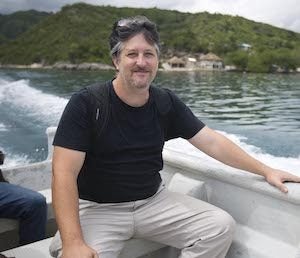
When Hurricane Matthew slammed into Haiti, killing more than 540 people and leaving a trail of destruction in its path, Associated Press (AP) reporter David McFadden was there.
“This has had one of the largest environmental impacts of any story that I have ever worked on,” said McFadden as he described widespread devastation, including ruined food crops “leveled like matchsticks,” contaminated wells, and thousands of displaced families. “The environmental impact of the hurricane in this area is going to be felt for years to come.”
McFadden was a Fellow at Metcalf Institute’s 2015 Annual Science Immersion Workshop for Journalists. As the Haiti-based AP reporter responsible for covering breaking news and developing enterprise stories for 27 Caribbean countries and territories, he has found many opportunities to draw on his Metcalf training.
“It helped me take very complex topics that the Caribbean region deals with everyday, be it climate change adaptation, pollution from the tourism industry, or renewable energy and focus on writing strong stories that will engage readers,” said McFadden. He also noted an appreciation for the opportunity to talk one-one-one with scientists at the Metcalf Annual Workshop to better understand how they approach their research.
“Often journalists want to come up with headlines that may not actually reflect the research they are trying to write about,” he said. “[Metcalf training] can absolutely give journalists a much stronger sense of how to pursue environmental stories and also [provide guidance on] how to speak with scientists and sources.”
McFadden began his career in an entirely different field. After receiving his BA degree in English from St. Joseph’s University in Pennsylvania, he worked in social work, but realized it wasn’t a good fit. He went on to earn a Master’s degree in Journalism from Boston University, landing his first reporting job at The Providence Journal in Rhode Island.
A few years later, he headed to Cambodia where he reported and edited for an English language newspaper, The Cambodia Daily. “Working in Cambodia really opened my eyes to the environmental beat,” he said. “Every story [in Cambodia] could be couched as a story on the environment because there was so much at stake out there.”
When he joined the AP in 2006, McFadden said environment stories didn’t receive much attention in the Caribbean. He sought to change that by carving out time to report on environmental issues while fulfilling his primary responsibilities of editing copy from regional freelance reporters or stringers, and covering elections, crime stories, and other breaking news. “It can be hard to keep the environmental stuff on the front burner, so you really have to push for that kind of coverage,” he added.
As for the future of environmental news coverage at the AP and across the globe, McFadden remains optimistic.
“Anybody with property along the coastline is interested in climate change whether or not they believe in the science,” he said. “There’s more emphasis on doing solid work and pushing the conversation forward about environmental issues.”
Read More Alumni Profiles